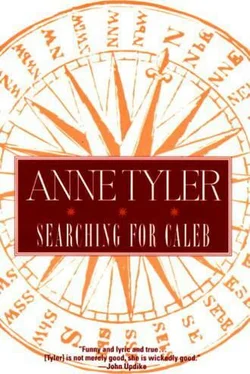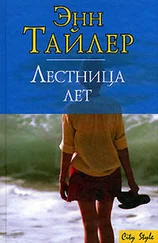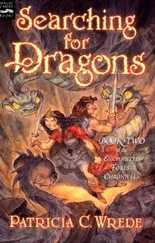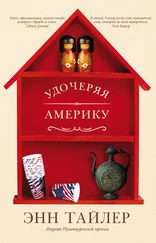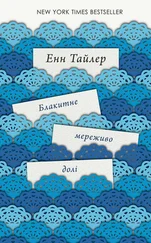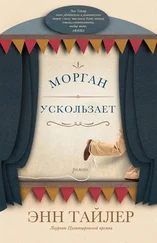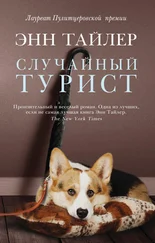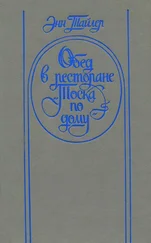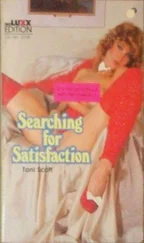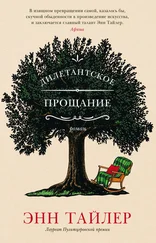“But neither do I, Duncan,” she said.
He didn’t have any answer for that.
So he would give a little salute to Caleb, and turn up his collar as if facing winter winds before he set off for the antique shop. Where there would be no customers anyway, now that opening hours were so uncertain. Where antiques lay in a jumble, dusty and neglected, and half the lightbulbs were out and the window was patched with adhesive tape. Look at this very newspaper column, spindled now on a Battue peg: WANTED antique shop mgr. must be reliable apply Silas Amsel Box 46 Caro Mill . But Justine was firm and cool and deliberate. Like her grandfather, she stiffened her pointy chin and set her head at a commanding angle. “It’s time we learned to stay in one place,” she told Duncan every night when he came home.
“Whatever you say, Justine.”
There was something underneath, some considerateness in his voice that made her turn on him. “Don’t you think so?” she asked him.
“Whatever you say.”
“Not what I say. Don’t you think so yourself? We’ve been moving around forever.”
“That’s very true,” he said.
“Why do you keep agreeing with me? Do you feel you have to humor me in some way?”
“No, no.”
But he did. She knew he did. It was because of her fetching Caleb. Wasn’t it? Duncan seemed to think she had gone crazy, or senile — or who knows? — running off like that to get Caleb. (She had assumed he would understand. She had called the antique shop from Box Hill: I’ll be away overnight, I think, Duncan, I don’t think I can find a plane out of New Orleans till tomorrow.” “New Orleans? Is that where you are? I thought you had left me,” he said. “I went home for lunch and you weren’t there.” She said, “ I wouldn’t leave you”—forgetting altogether that up till that afternoon she had been seriously considering it. She was so excited about meeting Caleb. And it was so good to hear Duncan’s voice on the telephone. It had completely slipped her mind how angry she was with him.) When she came back from New Orleans, Duncan gave Caleb a long look and then shook his hand. But the look he gave Justine was longer — a gentle, sad, pitying look, which she was going to remember till the end of her days. What could he be pitying her for? He didn’t even know that she had done all this illegally, so to speak. Yet during supper that night he had been so soft-voiced and solicitous, as if she were sick. When really there was nothing more natural than having your great-uncle come to stay with you.
Not that Duncan minded having Caleb. He got along with him very well. Better than Justine herself did, in fact. They had long discussions on jazz and blues and Creole food. Duncan would ask about Lafleur Boudrault, and Whisky Alley, and musical funerals and old-time cathouses, about which (Justine was surprised to hear) Caleb seemed to know everything. Caleb played Duncan’s harmonica, drawing forth from it such beautiful, disreputable sounds that Justine stood motionless and open-mouthed. This was her great- uncle?
But he didn’t like to be called Great-Uncle, or even Uncle. Perhaps he had been without relatives too long for such titles to sit easy on him. “Just ‘Caleb’ will do,” he said. And there had been so many difficulties in the way of his paying the rest of the family a visit. He was too tired from the trip; he was just getting used to Caro Mill; his arthritis was acting up. Thanksgiving would be better, he said. They could arrive unannounced and take the family by surprise. “Thanksgiving!” said Justine. It was barely November. Was it fair to keep everyone in the dark for so long? She was all for going this Sunday, perhaps, for Sunday dinner at Uncle Two’s. But Caleb refused, offering a dozen shiftless excuses. (“I’m scared I wouldn’t know anybody’s name,” he said.) Justine sighed. She had to admit there were times when Caleb disappointed her.
No, more than that. Tell the truth. There were times when she almost disliked him.
He had gone so far afield, it seemed. He had journeyed such a distance from his family. Now it appeared that the return trip was not that easy, maybe even impossible. He had a hundred habits and qualities that the Pecks would not have tolerated, skills they neither possessed nor wanted, bits of knowledge they would not know existed. Often he said things that horrified her. “Maybe,” he said, “we could just never let the family know, have you thought of that?”
“Why, Caleb!”
“I mean — Justine, I’m happy here with you and Duncan. Why go anywhere else? It would be like meeting strangers.”
“That’s ridiculous! It’s ridiculous.”
“I don’t have anything in common with them, Justine.”
“How can you say such a thing?”
“Do you think a one of them would recognize me?”
No. Not a one of them. Deep down, she knew it, and he and she would stare at each other in absolute agreement even while she continued to protest.
Sometimes she shut herself in her room and pulled out Caleb’s old photo, which she had taken from her grandfather’s pocket after he died. She studied it as if it could be read, not merely looked at. The gleam of Caleb’s Panama, the set of his shoulders, the perfect crispness of his tie. Nowadays he did not even wear a tie. His old jauntiness had become, somehow, boldness; his speech had a sharp, unpleasant tang. There was something spineless and lackadaisical in the way he walked. And she could not help noticing that still, wearing Daniel’s clothes and Duncan’s aftershave, he had the musty cabbage smell of a public institution.
Well, after all, he had been away so long.
Yes, but he had gone by degrees, traveling only where led, merely proving himself adaptable, endlessly adaptable.
As Justine herself had.
Then a trembling would rise from the soles of her feet, turn her stomach queasy, pass through the hollow of her chest to beat in her throat like a second heart. She stuffed the snapshot beneath a stack of magazines and hurried out to join the others.
* * *
In the afternoons, with Duncan asleep on the floor beside his disks, Justine brought Caleb up to date on the family. Even though he seemed not to care, she sat at the table earnestly filling him with history. She was amazed at how little time it took to tell — all those events unfolding over months and years, summed up now in minutes. “Richard did get married but it was annulled, the girl’s father had it annulled because she was under age, and since then he’s lived downtown in a—”
“Now, which was Richard?”
“Why, Uncle Mark’s son,” she said.
When she told how her mother died she spoke without inflection, as if hoping he wouldn’t catch it, but of course he did. He made no comment. When she talked about fortune telling he only looked interested. What did he really think? She imagined that he was about to define her; that at last, after clearing his throat, he would sum her up, announce where she had been heading all her life. She tensed expectantly whenever she caught him looking around the house, or glancing at her clothes, or staring at some toothless woman in socks and Wedgies who came to have her cards read. Surely he was judging their life, whose skimpiness she had just begun to realize. Any moment now he would give his verdict. But he never did. She kept trying to explain herself, even so. “You see we have always just — Duncan has kept wanting us to move around,” she told him.
“Is that right,” said Caleb.
“He likes to travel.”
“But he hasn’t traveled far .”
“What?” She searched her memory for other family news, meanwhile absently cracking a coffee bean with her teeth. “Now Aunt Lucy, she always says—”
Читать дальше
